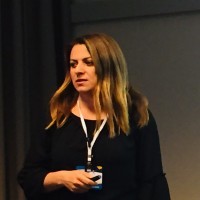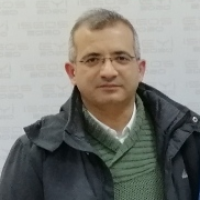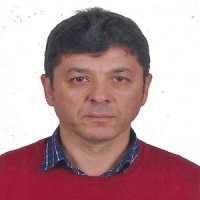Makaleler
Sayı Hakemleri



Dr. Amalendu Bhunia is the former Vice-Chancellor and the former Dean, Faculty of Arts & Commerce, University of Kalyani, West Bengal, India. He is a Professor, Department of Commerce, University of Kalyani. He has experience in teaching the subject of finance, taxation, and statistics for more than 28 years. He has published 112 research articles in foreign and national journals, 2 edited books as one of the editors, 13 research articles in edited volume, and 16 books in national and international repute. At present, his Google Scholar Citation is 1988 with an h-index of 25. He has completed 4 research projects funded by the University Grants Commission, India, and the Indian Council of Social Science Research. His research interests are in the financial markets, corporate finance, international finance, and behavioral finance. He has presented 60 research papers at various international and national conferences. Presently, he is serving as a member of the editorial board in 22 international journals including Scopus indexed, ADBC listed and UGC-CARE listed journals. He served as an Editor-in-Chief, American Journal of Theoretical and Applied Business (Science Published Group, USA) for two years. Also, he served as the Editor-in-Chief, Indo-Asian Journal of Finance and Accounting and Indian Journal of Finance and Economics (Academic Research Foundations Journals, India). Now he is the chief editor of the journal ‘Indian Accounting Review’. Dr. Bhunia is a professional member of International Society for Development and Sustainability (Japan), a member of Asian Council of Science Editor, Dubai and the members of various research associations around the globe. Dr. Bhunia acted as a keynote speaker in 55 national, 25 international, and 15 foreign conferences. Also, he acted as a keynote speaker in China, Turkey, UK, Nigeria, and Bangladesh. He acted as a Chairperson in various national and foreign conferences including Thailand and Bangladesh. He is specialized as a resource person in the subject of ‘Research Methodology’ and ‘Statistical Analysis on Quantitative Data’. 10 research scholars have awarded the





Arnavutça, İngilizce, Türkçe


Egemen İpek Tarsus Üniversitesi'nde Doçent olarak görev yapmaktadır. Doktorasını Karadeniz Teknik Üniversitesi İktisat alanından almıştır. 2013-2014 yıllarında Universitat Pompeu Fabra'da misafir doktora öğrencisi ve 2018-2019 yıllarında Brunel Üniversitesi Ekonomi ve Finans Bölümü'nde Misafir Öğretim Üyesi olarak görev yapmıştır. 2024-25 akademik yılında, Türkiye Bilimsel ve Teknolojik Araştırma Kurumu (TÜBİTAK) tarafından desteklenen 2219 projesi kapsamında enerji ekonomisi ve politikası ile ilgili konularda araştırma yapmak üzere Barselona Üniversitesi ve Barselona Ekonomi Enstitüsü'nde (IEB) ziyaretçi araştırmacı olarak bulunacaktır. Dr. İpek'in araştırma alanları arasında hanehalkı ekonomisi, tüketici talep analizi, sağlık ekonomisi ve uygulamalı mikroekonometri yer almaktadır.






Graduated from METU, Department of Economics (1986). Worked at TUIK and Isbank Headquarters (1986-1993). Received MA (1996) and PhD (2000) degrees from Purdue University both in Economics. Worked at Kirikkale University and Aksaray University (2000-2015). Became associate professor (2004) and full professor (2009) in economic development and international economics. He has been working as professor of economics at N. Erbakan University since 2015. He has published in a wide range of areas including 19 books, 15 translated books from English, contributed to 55 edited books, and around 100 scientific articles in different national and international peer-reviewed scientific journals. Areas of interest include general equilibrium analysis, agriculture and agricultural policies, regional economic integration, Turkey-EU relations, economic freedoms, globalization and free market economy. He is a member of Turkish Academy of Sciences (TUBA).



 Web
Web









Lisans: Atatürk Üniversitesi İktisat (2003)
Yüksek Lisans: Adnan Menderes Üniversitesi İktisat (2007)
Doktora: The University of Warwick, Coventry, İngitere. (2015)



Amaç ve Kapsam
Sosyoekonomi is committed to promoting debates in economics but not only designed for studies and research on socioeconomic issues, but also on public economics and public finance, political economy, business economics, labour economics, law and economics, economic sociology, economic history and also has been published as hard copies and via the internet.
The journal serves as a leading platform for academics, researchers, and practitioners to present their research to an audience as broadly as possible. To fulfil its commitment, all papers published in Sosyoekonomi are open access. The journal welcomes article submissions from all areas of economics.
Yazım Kuralları
1. Sosyoekonomi Dergisinde sadece Türkçe ve İngilizce makaleler yayımlanmaktadır. Dergiye gönderilen makaleler başka bir yerde yayımlanmamış veya yayımlanmak üzere gönderilmemiş olmalıdır.
2. Yazılar A4 boyutunda kâğıda, tek aralıkla, Times New Roman karakterinde, 11 punto ile ve 24 sayfayı geçmeyecek şekilde yazılmalıdır. DergiPark platformu dışından yapılan gönderiler kesinlikle kabul edilmemektedir.
3. Gönderilecek Word dosyasının ilk sayfasında Türkçe ve İngilizce olarak şu bilgiler yer almalıdır: (i) yazının başlığı; (ii) en çok 100 kelimelik özet; (iii) anahtar sözcükler; ile (iv) çalışmanın JEL kodları; ayrı bir Word dosyasında ise (i) yazar(lar)ın adı; (ii) ORCID ID numaraları; (iii) yazar(lar)ın bağlı bulunduğu kurumun açık adı; ile (iv) yazar(lar)ın e-mail adresi ve telefon numarası belirtilmelidir. Etik onayı gerektiren ve ankete dayalı çalışmalarda ilgili kurumdan alınan “Etik Kurul İzin Belgesi” başvuru anında sisteme yüklenmelidir.
4. Tablo, şekil ve grafiklere başlık ve numara verilmeli, başlıklar tablo, şekil ve grafiklerin üzerinde yer almalı, kaynaklar ise tablo, şekil ve grafiklerin altına yazılmalıdır. Rakamlarda ondalık kesirler virgül ile ayrılmalıdır. Denklemlere verilecek sıra numarası parantez içinde sayfanın en sağında ve parantez içinde yer almalıdır. Denklemlerin türetilişi, yazıda açıkça gösterilmemişse, hakemlerin değerlendirmesi için, türetme işlemi bütün basamaklarıyla ayrı bir sayfada verilmelidir.
5. Yazılarda yapılan atıflara ilişkin dipnotlar sayfa altında yer almalıdır.
6. Kaynaklara göndermeler dipnotlarla değil, metin içinde, sayfa numaralarını da içererek, aşağıdaki örneklerde gösterildiği gibi yapılmalıdır:
……..belirtilmiştir (Alkin, 1982: 210-215).
..........Griffin (1970a: 15-20) ileri sürmektedir.
(Gupta vd., 1982: 286-287).
(Rivera-Batiz & Rivera-Batiz, 1989: 247-249; Dornbusch, 1980: 19-23).
7. Metinde gönderme yapılan bütün kaynaklar, sayfa numaraları ile birlikte, “Kaynaklar” (“Kaynakça” diye yazılmayacak) başlığı altında ve aşağıdaki örneklere uygun olarak belirtilmelidir:
Kitaplar: Kenen, P.B. (1989), The International Economy, Englewood Cliffs, N.J.: Prentice-Hall, Inc.
Dergiler: Langeheine, B. & U. Weinstock (1985), “Graduate Integration”, Journal of Common Market Studies, 23(3), 185-197.
Derlemeler: Krugman, P. (1995), “The Move Toward Free Trade Zones”, içinde: P. King (ed.), International Economics and International Economic Policy: A Reader (163-182), New York: McGraw-Hill, Inc.
Diğer Kaynaklar: Türkiye Cumhuriyet Merkez Bankası (2001), 2002 Yılında Para ve Kur Politikası ve Muhtemel Gelişmeler, Basın Duyurusu, 2 Ocak, Ankara, <http://www.tcmb.gov.tr>.
Chang, R. (1998), “The Asian Crisis”, NBER Discussion Paper, 4470, National Bureau of Economic Research, Cambridge, Mass.
8. Kaynaklar’da web sitelerine yapılan atıflar muhakkak, gün, ay, yıl olarak alındığı tarih itibariyle ve tam adresleriyle birlikte belirtilmelidir.
………………………………, <http://www.sosyoekonomijournal.org>, 18.12.2024.
Etik İlkeler ve Yayın Politikası
PUBLICATION ETHICS
Sosyoekonomi Journal is dedicated to ensuring best practices on ethical matters, errors, and retractions. Plagiarism in all its forms constitutes unethical publishing behavior and is unacceptable. Conformance to standards of ethical behavior is expected of all parties involved: Editors, Authors, and Reviewers. The following ethics topics outlined for editors, authors, and reviewers are based on the COPE Code of Conduct for journal editors. Editors, authors, and reviewers will also adhere to the Sosyoekonomi Journal submission guidelines.
Editor's Duties:
Publication Decisions The editor has complete responsibility and authority to accept, reject or request modifications to the manuscript. The editor does not reject papers based on suspicions, they shall have proof of misconduct.
Review of Manuscripts The editor ensures that each manuscript submitted to the Sosyoekonomi Journal is reviewed for its intellectual content without regard to sex, gender, race, religion, citizenship, etc. of the authors. The editor also ensures that each manuscript is initially evaluated by the editor for originality, making use of appropriate software to do so. Following desk review, the manuscript is forwarded to blind peer review to make a recommendation to accept, reject, or modify the manuscript.
Ethical Guidelines The editor shall ensure that all research material they publish conforms to internationally accepted ethical guidelines. Editors take reasonable responsive measures when ethical complaints have been presented concerning a submitted manuscript or published paper.
Confidentiality The editor ensures that information regarding manuscripts submitted by the authors is kept confidential to anyone other than the corresponding author, reviewers, potential reviewers, other editorial advisers, and the publisher, as appropriate.
Disclosure and Conflicts of Interest The editor shall not use unpublished materials disclosed in a submitted manuscript for his/her own research without the written consent of the author.
Authors' Duties:
Originality and Plagiarism The authors must ensure that their work is entirely original works, and relevant previous work/words and publications, both by others and the authors' own should be appropriately acknowledged and referenced. Authors must certify that the manuscript has not previously been published elsewhere in any language.
Multiple Submissions Authors must certify that the manuscript is not currently being considered for publication elsewhere.
Authorship Authorship should be limited to those who have made a significant contribution to the conception, design, execution, or interpretation of the reported study. The corresponding author should act as a point of contact between the editor and the other authors and should keep co-authors informed and involve them in major decisions about the publication. Any change to the author list should be approved by all authors including any who have been removed from the list. Papers submitted by co-editors or editorial board members of Sosyoekonomi Journal as to whether the corresponding author or not should have handled by the editor and papers submitted by the editor as to whether corresponding author or not should have handled by one of the editorial board members to ensure unbiased and independent handling of such papers. Editor, co-editors, and editorial board members have no right to any process of their papers after they are submitted.
Peer Review Process Authors must participate in the peer-review process. They should inform the editor if they withdraw their work from review, or choose not to respond to reviewer comments after receiving a conditional acceptance. Authors must respond to reviewers' comments in a professional and timely manner.
Data Authenticity and Retention Authors must identify all sources used in the creation of their manuscripts. Authors must state that all data in the paper are real and authentic. They should present their results clearly, honestly, and without fabrication (making up research data), falsification (manipulation of existing data), or inappropriate data manipulation.
Disclosure and Conflict of Interest All authors must notify the Editors of any conflicts including a statement disclosing any financial or other substantive conflicts of interest that may be construed to influence the results or interpretation of their manuscript. Funding sources should be disclosed.
Fundamental Errors Authors should alert the editor promptly if they discover an error in any submitted, accepted, or published work. Authors should cooperate with editors in issuing corrections or retractions when required.
Research on Human Subjects When appropriate, all authors must cite approval by an institutional review board (IRB) for research on human subjects.
Reviewers' Duties:
Confidentiality Reviewers must keep all manuscripts received for review confidential. Privileged information or ideas obtained through peer review must be kept confidential and not used for personal advantage.
Standards of Objectivity Reviewers should be objective and constructive in their reviews with no personal criticism of the author.
Supporting Argument Reviewers should express their views clearly and observations should be formulated clearly with supporting arguments so that authors can use them for improving the paper. They should not make derogatory personal comments or unfounded accusations. Reviewers should be specific in their criticisms, and provide evidence with appropriate references to substantiate general statements such as, 'this work has been done before, to help editors in their evaluation and decision and in fairness to the authors.
Plagiarism, Fraud and Other Ethical Concerns Reviewers should let the editor know if they suspect/find that a manuscript is a substantial copy of another work, citing the previous work in as much detail as possible. Reviewers should also identify relevant published work that has not been cited by the authors.
Acknowledgement of Sources Reviewers must ensure that authors have acknowledged all sources of data used in the research. They should identify cases in which relevant published work referred to in the paper has not been cited in the reference section. They should point out whether observations or arguments derived from other publications are accompanied by the respective source.
Conflicts of Interest Reviewers should not review manuscripts in which they have conflicts of interest resulting from competitive, collaborative, or other relationships or connections with any of the authors, companies, or institutions connected to the papers.
Promptness Any selected referee who feels unqualified to review the research reported in a manuscript or knows that its prompt review will be impossible should notify the editor and excuse himself from the review process. In the event that a reviewer feels it is not possible for him/her to complete the review of the manuscript within stipulated time should also notify the editor so that the manuscript could be sent to another reviewer.
Ücret Politikası
Submission fee is non-refundable and required to be paid before peer-reviewing process.
For more information please visit the link below:
http://www.sosyoekonomijournal.org/submit.html



